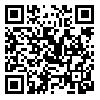2- Professor of Psychology & Educational Sciences Faculty, Allame Tabataba'ee University
3- Assistant Professor of Psychology & Educational Sciences Faculty, Allame Tabataba'ee University
4- Substance Abuse and Dependency Research Center, University of Social Welfare & Rehabilitation Sciences, Tehran, Iran. ,
Objective: This study examined the effectiveness of Marlatt’s cognitive-behavioral model on increasing self-efficacy in opiate-dependents.
Materials & Methods: In a pilot project, 30 opiate-dependent clients of addiction clinics in Khorramabad were randomly assigned to study and control groups. The study group went through 12 sessions of cognitive behavioral therapy an overall 24 hours. The control group did not receive any special treatment. All the participants completed the self-efficacy questionnaire at the beginning and end of treatment. Analysis of covariance was used to analyze data.
Results: Findings showed significant differences between the two groups after intervention.
Conclusion: According to the findings Marlatt’s cognitive behavioral model is effective in increasing self-efficacy in opiate-dependents.
Received: 16/12/2013 | Accepted: 23/02/2014 | Published: 7/03/2014
| Rights and permissions | |
 |
This work is licensed under a Creative Commons Attribution-NonCommercial 4.0 International License. |


